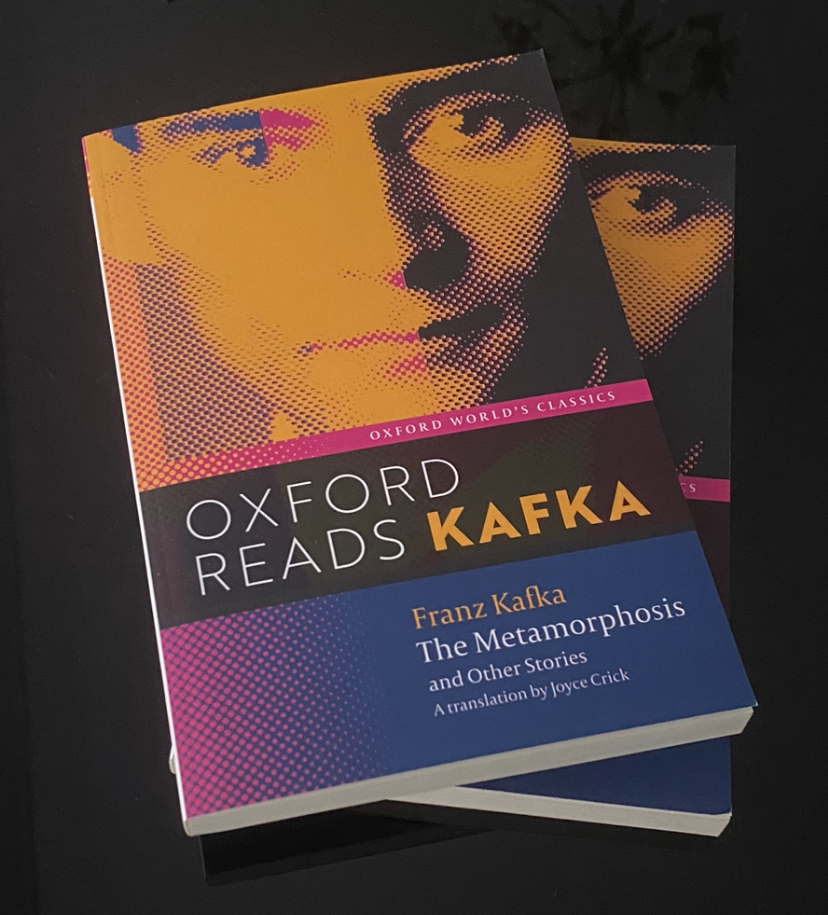
Oxford Reads Kafka: A Metamorphosis in Your Hands
Posted on July 11, 2024 in Oxford

2024 isn’t just any year for Franz Kafka fans. The literary giant is being celebrated in grand style. The hundred-year anniversary of his untimely death has been embraced with particular fervour by the University of Oxford. The German-speaking writer published seven small books in his lifetime, asking his friend, Max Brod, in his will, to destroy his unfinished works. It is lucky for us that Brod ignored his wishes, leaving the Bodleian Libraries in Oxford with the largest Kafka archive worldwide and the opportunity this year to inspire audiences across disciplines, ages and locations with a year-long tribute.
The global legacy of Kafka and his literary works has been celebrated with a diverse programme of events and activities. Oxford’s University Parks had a visit from a gigantic, inflatable half-man half-insect called the ‘Jitterbug’. A mixture of prominent literary figures, university academics, student representatives and civic leaders joined together in a collective public reading of Kafka’s well-known story The Metamorphosis. The centenary has prompted an exhibition entitled ‘Kafka: Making of an Icon’ which continues until October. It features literary notebooks, diaries, drawings, letters, photographs and more material from the Bodleian’s Kafka archive. The exhibition establishes for the year-long celebrations a model for deeply engaging with Kafka’s puzzling and sometimes disturbing narratives.
Behind the lectures, exhibitions, musical and dance spectacles, the limited edition re-imprint of Kafka’s The Metamorphosis has stolen the show. Published by Oxford University Press, the cover makes a gesture to pop art with a striking yellow and pink print of Kafka. Inside the book, Kafka’s narrative enigmas fill each page, charismatically translated by Joyce Crick. But the marked aesthetic and content is not all that makes this edition the star.

What truly sets this edition apart is its role in fostering a broader engagement with Kafka’s work. Every Oxford student, both undergraduate and postgraduate, and members of university staff, received a copy. This wasn’t just a thoughtful gesture; it was a strategic move to ignite literary curiosity across disciplines. The aim? To create a new and integrated audience drawing on literature, language, science, mathematics.
The imprint was not limited to the university’s walls. Copies were distributed to schools and libraries across Oxfordshire. Budding young readers and the wider community could experience Kafka’s unsettling narratives firsthand. The printed book became a symbol for enabling individuals to become readers, and past writers to become modern icons.
Is this a new take on limited edition print? Or a realisation of its potential to unite communities and create new and diverse audiences? Instead of being merely an exclusive item, a collectible prized for its singularity, this edition emphasises inclusivity and accessibility. It may be sitting on a free desk in a local library or a new addition to the school bookshelves. These are stories which Kafka himself burned in his struggles with self-doubt. But in this celebration of collective readership, a published edition rescues stories from the fire.
Whether you are a seasoned fan of Kafka or discovering his work for the first time, the Oxford Reads Kafka edition of The Metamorphosis holds importance beyond the individual writer. It is a tangible symbol of how publishing can be a catalyst for inclusive and present readership. In this special but unifying publication, we can see how a book excites a community, how a limited edition imprint becomes a collective and collaborative exploration.
Read more about the Oxford Kafka 24 programme here
Written by Florie Harmer




 Listen to the podcast
Listen to the podcast  Explore the Youtube channel
Explore the Youtube channel